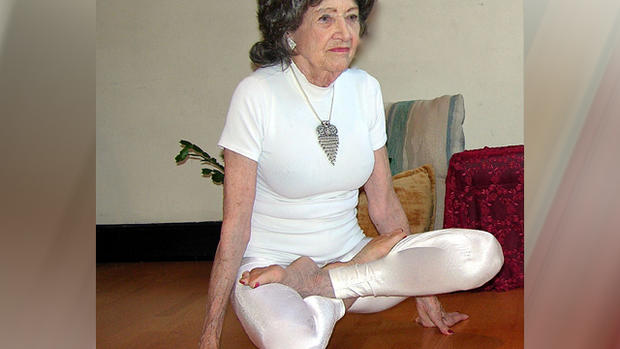Researchers discover optimism may lead to longevity
(CBS News) The secret to a long life may be something as simple as a sunny disposition.
In a study published in the journal Aging on May 21, researchers surveyed people who were over the age of 95 and found that most of them had positive personality traits, making them upbeat and relaxed about life. That suggests personality traits such optimism could be part of the longevity genes mix, they said.
Want to live to 100? What experts recommend
"When I started working with centenarians, I thought we'd find that they survived so long in part because they were mean and ornery," Dr. Nir Barzila, the Ingeborg and Ira Leon Rennert Chair of Aging Research, and director of Einstein's Institute for Aging Research, said in the press release. "But when we assessed the personalities of these 243 centenarians, we found qualities that clearly reflect a positive attitude towards life. Most were outgoing, optimistic and easygoing. They considered laughter an important part of life and had a large social network. They expressed emotions openly rather than bottling them up."
The study is part of Albert Einstein College of Medicine's Longevity Genes Project, which specifically looks at aging. Over 500 Ashkenazi Jews over the age of 95 along with 700 of their offspring have been involved in the project.
According to the researchers, approximately 53,000 people in the U.S. are over 100 years old, which accounts for 0.2 percent of the population. But, the number of people reaching 100 from America has increased 8 percent per year.
For this particular study, 243 Ashkenazi (Eastern European) Jews over the age of 95 were given a 98-point questionnaire that specifically looked at personality traits. Three-fourths of the group were women, and the average age was 97.6 years old. Since they were all the same ethnicity, it allowed researchers to compare results from a similar genetic pool.
What scientists found out was that many of the near-centenarians were optimistic, easygoing, liked to laughed and were outgoing than introverted. They also were more likely to express their emotions, rather than keeping it all inside.
Dr. Thomas Perls, director of the New England Centenarian Study at Boston University Medical Center, told HealthDay that the results about expressing how they felt were in line with several previous studies. One of Perls studies showed that those who were highly neurotic tended to dwell on things and internalize their stress.
"This can translate into increased risk for cardiovascular disease," he said to HealthDay. "High extroversion may lead to a better ability to establish social support networks -- which is very good for older people - and to be cognitively engaged."
Perls suggested that activities like physical exercise, yoga, tai chi and laughing a lot could help relieve tension. Also, sleeping was shown to have some beneficial effect.
The good news is that if you aren't exactly that ray of sunshine, you still have time to change. Barzilai said that some evidence shows that people can change their attitudes between the ages of 70 to 100, and it isn't exactly know if the subjects were always optimistic their entire lives.
"Nevertheless, our findings suggest that centenarians share particular personality traits and that genetically-based aspects of personality may play an important role in achieving both good health and exceptional longevity," he said in the press release.


